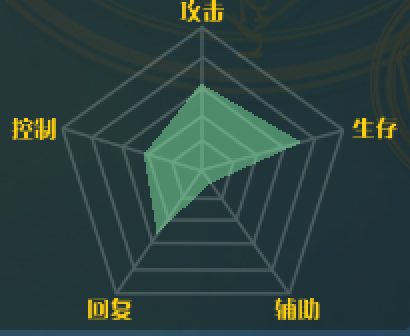【Unity】新的UI系統技巧
阿新 • • 發佈:2018-10-31
從Unity4.6開始,集成了新的UI系統。這篇文章將記錄新的UI系統的一些使用技巧,內容將不斷增加~~~
1)給人物加血條效果
把要掛載的父節點的RectTransform中的錨點設定位buttonLeft。並獲得當前的Canvas中的CanvasScaler,計算出縮放因子(比如下面是按照y來進行縮放的)
CanvasScaler scaler = GetComponent<CanvasScaler> (); if(scaler != null) { float s = scaler.referenceResolution.y / Screen.height; UIScaleFactor = Vector3.one * s; // 初始化縮放因子, 因為本遊戲是按照高度來縮放的,所以這裡是y的縮放因子 } else { Debug.LogError("[UIBattle] Cannot get component of CanvasScaler!"); } ..... var pos = Camera.main.WorldToScreenPoint(BloodBarPos); // 獲取螢幕地址 pos.Scale(UIScaleFactor); // 進行縮放 bloodTrans.anchoredPosition = pos; // 設定位置,當然這個bloodTrans在某個錨點在ButtonLeft的父節點下
2) 定製一個雷達圖控制元件:
using System.Collections; using UnityEngine.UI; [ExecuteInEditMode] public class RadarChart : Graphic { public RectTransform[] maxPoints; private float[] percents = new float[5] { 1, 1, 1, 1, 1 }; private Vector3[] vertexes = new Vector3[6]; private bool isDirty = true; void Update() { #if UNITY_EDITOR isDirty = true; #endif if(isDirty) { isDirty = false; refresh(); } } public void refresh() { vertexes[0] = maxPoints[0].anchoredPosition; for(int i=1; i<maxPoints.Length; i++) { vertexes[i] = maxPoints[0].anchoredPosition + (maxPoints[i].anchoredPosition - maxPoints[0].anchoredPosition)*percents[i-1]; } SetAllDirty(); } public float perA { get { return percents[0]; } set { percents[0] = Mathf.Clamp01(value); isDirty = true; } } public float perB { get { return percents[1]; } set { percents[1] = Mathf.Clamp01(value); isDirty = true; } } public float perC { get { return percents[2]; } set { percents[2] = Mathf.Clamp01(value); isDirty = true; } } public float perD { get { return percents[3]; } set { percents[3] = Mathf.Clamp01(value); isDirty = true; } } public float perE { get { return percents[4]; } set { percents[4] = Mathf.Clamp01(value); isDirty = true; } } protected override void OnPopulateMesh(Mesh m) { var r = GetPixelAdjustedRect(); var v = new Vector4(r.x, r.y, r.x + r.width, r.y + r.height); Color32 color32 = color; using (var vh = new VertexHelper()) { foreach (Vector3 p in vertexes) { vh.AddVert(p, color32, Vector2.zero); } vh.AddTriangle(2, 0, 1); vh.AddTriangle(3, 0, 2); vh.AddTriangle(4, 0, 3); vh.AddTriangle(5, 0, 4); vh.AddTriangle(1, 0, 5); vh.FillMesh(m); } } }
編輯器程式碼:
using UnityEditor; using UnityEngine; using System.Collections; [CustomEditor(typeof(RadarChart))] public class RadarChartEditor : Editor { SerializedProperty maxPointsProp, color, raycast, material; SerializedProperty percents; string[] names ; void OnEnable() { maxPointsProp = serializedObject.FindProperty("maxPoints"); percents = serializedObject.FindProperty("percents"); color = serializedObject.FindProperty("m_Color"); raycast = serializedObject.FindProperty("m_RaycastTarget"); material = serializedObject.FindProperty("m_Material"); names = new string[6] { "Center", "ATK", "HP", "ASS", "REV", "CON" }; } bool showMaxProp = false, showPercent = true; public override void OnInspectorGUI() { serializedObject.Update (); showMaxProp = EditorGUILayout.Foldout(showMaxProp, "Max Points"); if(showMaxProp) { int size = maxPointsProp.arraySize; for(int i=0; i<size; i++) { SerializedProperty p = maxPointsProp.GetArrayElementAtIndex(i); EditorGUILayout.PropertyField(p, new GUIContent(names[i], "")); } } EditorGUILayout.PropertyField(raycast); EditorGUILayout.PropertyField(material); EditorGUILayout.PropertyField(color); EditorGUILayout.Space(); showPercent = EditorGUILayout.Foldout(showPercent, "percents"); if(showPercent) { int size = percents.arraySize; for(int i=0; i<size; i++) { SerializedProperty p = percents.GetArrayElementAtIndex(i); EditorGUILayout.Slider(p, 0, 1, new GUIContent(names[i+1], "")); } } serializedObject.ApplyModifiedProperties (); } }
3) 定製屬性面板
官方有一個很不錯的例子:http://docs.unity3d.com/ScriptReference/Editor.html
把Property暴露到面板上:http://wiki.unity3d.com/index.php?title=Expose_properties_in_inspector
詳細的Editor例子:http://catlikecoding.com/unity/tutorials/editor/custom-list/
http://catlikecoding.com/unity/tutorials/editor/custom-data/
Editor高階例子:http://catlikecoding.com/unity/tutorials/editor/star/


